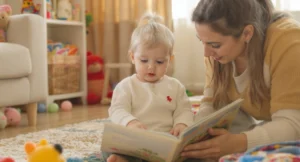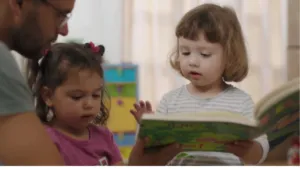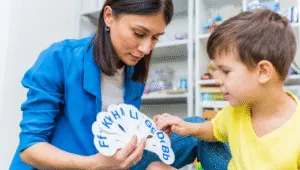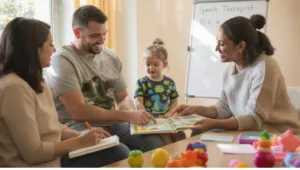When a 4-Year-Old Not Talking But Understands child shows strong receptive language skills yet struggles with expressive speech, parents often find themselves navigating uncharted territory where their little one can follow complex instructions and comprehend stories but remains largely non-verbal.
This persistent gap between understanding language and the ability to communicate verbally presents a unique challenge that requires immediate attention, as early intervention proves critical in addressing what might stem from underlying issues ranging from oral-motor problems to individual variability in development.
Seeking professional help becomes essential when speech development lags significantly behind peers, particularly if the lack of progress persists despite regular exposure to language-rich environments where conversations, books, and verbal interaction abound.
Understanding How We Express and Understand Language
4-Year-Old Not Talking But Understands. When a child demonstrates strong receptive abilities, meaning they understand language, recognize familiar objects, and respond to basic desires, yet struggles with expressive language (the ability to express thoughts through words or sentences), it highlights a developmental difference that parents must recognize early.
This gap between understanding and verbal expression often means the child’s brain areas responsible for processing receptive language are developing at their own pace, while production areas, those that coordinate the lips, tongue, and jaw to make sounds, lag significantly.
Medical conditions like hearing loss, chronic ear infections, neurological disorders, or even genetic predispositions can impede the articulation and formation of speech, making it crucial for caregivers to observe whether the child can imitate sounds, use gestures, or communicate through alternative ways beyond verbal speech, prompting consideration of early intervention therapy for children.

Why Can My Child Understand But Not Talk?
When children understand and comprehend instructions yet struggle with verbal expression, several underlying factors might be at play. Developmental variations occur naturally. Some kids process linguistic input effectively but face challenges with articulation or forming words, which must be monitored carefully.
Oral motor difficulties, neurological differences, or even temperament can impact how a child expresses thoughts despite having strong receptive language skills. Parents must recognize that this distinction between understanding language and producing it doesn’t always indicate a serious problem, though consulting a speech pathologist remains important for proper assessment.

Language Skills at Age 4
4-Year-Old Not Talking But Understands. By age four, most children should be using multi-word sentences to express their needs and desires, clearly articulating thoughts that are understood by family members and peers.
Normal development involves producing sounds correctly, following complex directions, and practicing conversation skills through storytelling and interactive play.
Parents must recognize that while milestones differ slightly between children, they must trust their instincts when something seems concerning. Speech development at this stage should show consistent progress in both articulation and the ability to communicate ideas effectively.

Knowing When to Consult a Professional
If your 4-year-old is not talking but understands everything you say, it’s critical to recognize when professional guidance becomes necessary. While some children naturally progress at different rates, signs of delay warrant evaluation, especially when speech development lags significantly behind receptive abilities.
Consider consulting professionals if your child struggles to form basic sentences, shows difficulty expressing needs, or exhibits limited vocabulary despite comprehending complex instructions. Talk to your pediatrician, who can assess the situation and provide a referral to a speech pathologist for individualized therapy.
Getting help early ensures your child receives appropriate intervention during these critical years, allowing them to overcome barriers and reach their full potential through effective, evidence-based techniques.
Tips for Boosting Language Skills
4-Year-Old Not Talking But Understands. Creating opportunities for interaction within natural contexts proves highly effective for caregivers who actively participate in structured play while modeling correct word formation and practicing exercises during routine activities like feeding or bath time, and often see remarkable progress.
Encouraging reading, singing, and conversing throughout the day provides essential stimulation, though parents must remember that fostering growth requires patience and dedication rather than constant pressure.
The approach works best when families receive training on strategies that promote spontaneous communication, implementing children’s psychotherapy techniques where children can express their feelings and needs through spoken language, while caregivers offer supportive coaching that helps them overcome barriers naturally.
Main Points
When a four-year-old child isn’t talking but clearly understands what’s being said, this signals an expressive language delay where receptive skills remain strong, a pattern commonly observed in early childhood.
Parents must recognize that while some children naturally develop speech at different rates, seeking professional help from a speech-language pathologist (SLP) becomes essential when delays persist beyond typical milestones, as early intervention can significantly improve long-term outcomes.
Rather than comparing your child to others and feeling inadequacy or anxiety, focus on recognizing signs that warrant evaluation such as limited vocabulary (fewer than 1000 words), inability to string together simple sentences, or trouble with pronunciation and reach out to your pediatrician or a qualified therapist for guidance, as addressing these concerns early through tailored support and strategies empowers families to help their child thrive and achieve their full potential.
How We Help Families Navigate Speech Delays
When families face concerning moments with a 4-year-old not talking but understands, addressing these challenges becomes essential through specialized support that helps children thrive our qualified practitioners use evidence-based techniques alongside family collaboration, knowing it’s critical to empower parents with tools that make significant impacts, enabling every child to achieve successful communication outcomes naturally while fostering overall well-being through compassionate guidance, and parents should remember that early intervention creates lasting foundations for language development.

Putting It All Together
When a 4-year-old not talking but understands everything you say, it reveals a fascinating disconnect where receptive language flourishes while expressive output lags behind. This pattern often emerges from environmental factors, perhaps limited opportunities for verbal interaction, or a temperament that favors cautious observation over spontaneous communication.
Parents might notice their child gestures effectively, follows complex instructions, and clearly comprehends conversations, yet struggles to construct sentences or articulate needs verbally a concern that requires recognizing how children process meaning through listening and interpreting cues.
What makes this situation particularly nuanced is understanding that strong receptive skills don’t always predict when speaking will naturally emerge; some children simply need targeted support to transfer their internal linguistic wealth into confident verbal communication, emphasizing the importance of addressing this specific gap where they comprehend yet remain hesitant to communicate through speech
FAQs
Q: What if my child’s receptive abilities are strong, but their expressive output remains minimal even after two months of observation?
A: Schedule an evaluation with a trained professional who can identify whether intellectual factors, hearing issues diagnosed by an audiologist, or processing challenges are contributing to this gap.
Q: How do I know when parental concern about delayed verbal production must lead to seeking professional help rather than just the patient waiting?
A: If your 4-Year-Old Not Talking But Understands shows no improvement over several months, cannot put multiple words together, or has difficulties being understood by people outside the family, immediate assistance is crucial.
Q: Can daily routines like mealtime, bath time, and bedtime genuinely promote language growth without formal intervention?
A: Yes, incorporating age-appropriate structures into everyday situations, naming objects around the house, and explaining what you’re doing while you cook a meal or clean a room creates a rich linguistically supportive environment.
Q: Why must I avoid baby talk and minimize proper grammar when communicating with my child who understands but doesn’t speak?
A: Modeling correct pronunciation and proper sentence structures gives your child the right patterns to eventually imitate, whereas simplified language learned in a low-quality setting can delay their expressive development further.
Q: What role does social interaction through playdates, parent-child groups, or community activities play in encouraging a quiet 4-year-old to finally start talking?
A: Arrange opportunities where your child can observe peers converse, participate in games that involve taking turns asking questions, and engage in imaginative play. These valuable learning experiences foster natural growth and empowering progress.

